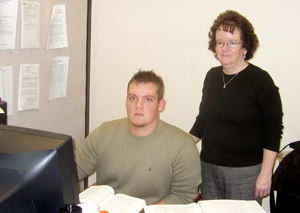ADP Service Spotlight for December
 |
| Grad student Thomas Shulte and faculty
member Corliss Lentz look over one of Shulte's current projects.
Shulte was impressed by the sincere gratitude he received
from those he helped during a hurricane relief effort. |
As Corliss Lentz prepared to meet her Political Science 393 class
for the first time in late August 2005, Tropical Depression 12
was a 30 knot squall over the Central Bahamas. It was of little
interest to anyone other than a few optimistic Weather Channel
storm chasers.
Less than a
week later it was Hurricane Katrina, roaring across Florida and
slamming into the New Orleans area. It threw the Gulf Coast into
turmoil, and the entire country as well, creating a disaster
from which we are yet to fully recover.
Half of Lentz's
42 students, most of whom had never heard the term "service
learning" and many who were appalled that it was something
they were being asked to do, would end up working with the Louisiana
refugees.
Lentz, associate
professor of political science, has been teaching the social
policy class since 1997. Four years ago she added the 20 hours
of volunteer work requirement, as well as a paper on what the
students learned from it and a class presentation.
The paper and
the presentation are what made the service "service learning."
"You should
see their faces on the first day of class when I explain to them
what they have to do," said Lentz.
She admits
it was not an original idea as other universities have used the
concept longer. Now the American Democracy Project at SHSU is
encouraging faculty members to make it a part of their classes
when practical.
Lentz's reasoning: "Most
of our students have had little exposure to the poor, and are
therefore unsympathetic. They may know that 15 percent of the
population is in poverty, but they have absolutely no sense of
what this means."
Faculty
members who make service and reflection on it a part of their
courses are enthusiastic about its benefits. Students who have
done it are downright effusive when they talk about what it has
done for them as well as those they help.
Casi Countz
remembers working with a first grader from New Orleans who was
behind in learning to read. He was reclusive at first. When she
discovered that he liked the cartoon "The Fox and the Hound," and
found him a book about a puppy to read together, he opened up.
"Adjusting
to his needs and taking the time to win him over is something
that I would have never done before this assignment," she
wrote.
The experience
also broadened her perspective.
"I realized
that the people that I wanted to help, who had made me nervous
and even a little scared, are just like me. They have just fallen
on hard times or need help in areas that I am good in, that's
all, and there is no reason to put off helping them any more."
Lentz's students
were as lucky in their opportunities for service last fall as
the people of Texas and Louisiana were unlucky in being hit by
two storms. Thomas Schulte worked in a Red Cross shelter during
Hurricane Rita.
"I was
able to overcome any apprehension that I felt prior to my service
and left the project with an incredible experience, a new sense
of self-worth, and a greater understanding of the concept of
service learning," wrote Schulte.
"It was
amazing to experience the feeling of seeing the looks on these
people's faces and the sincerity in their voices when they thanked
me for doing something as simple as setting up a cot or handing
out a warm meal."
Jerry Cornwall
has a more global perspective, after working for the United Nations
Children's Fund, also known as UNICEF.
"In the
past I always asked myself why the United States is always helping
people in Third World countries," he wrote, "when we
have so many people here in the United States that need help.
"I realize
that there are children here in the United States that live in
horrible circumstances and those children are helped by our welfare
programs and by UNICEF since September, but on the whole the
children of the United States are in a much better position than
anywhere else in the world."
Laci Mayton
helped with the YMCA's Partners of Youth program.
"Before
volunteering," she wrote, "I had felt that I didn't
care enough about the organization that I was volunteering for.
After all that I did, however, I realize that I did not care
before, but once I met the people and got involved, I did."
Paul Cassidy
worked with the Huntsville school district's Disciplinary Alternative
Education Program, coming to believe that he should share his "knowledge
and wealth."
"The knowledge
I possess is due to my education," he wrote. "The wealth
comes from the education and the opportunities that it will provide.
Learning through service is a necessary occurrence in order for
society to grow."
Joe Reagey, who
worked with the Good Shepherd Mission in Huntsville, summed it
up this way:
"The service
learning project was the most meaningful assignment I have experienced
at Sam Houston State University."
—END—
SHSU Media Contact: Frank Krystyniak
Dec. 6, 2006
Please send comments, corrections, news tips to Today@Sam.edu.
|


